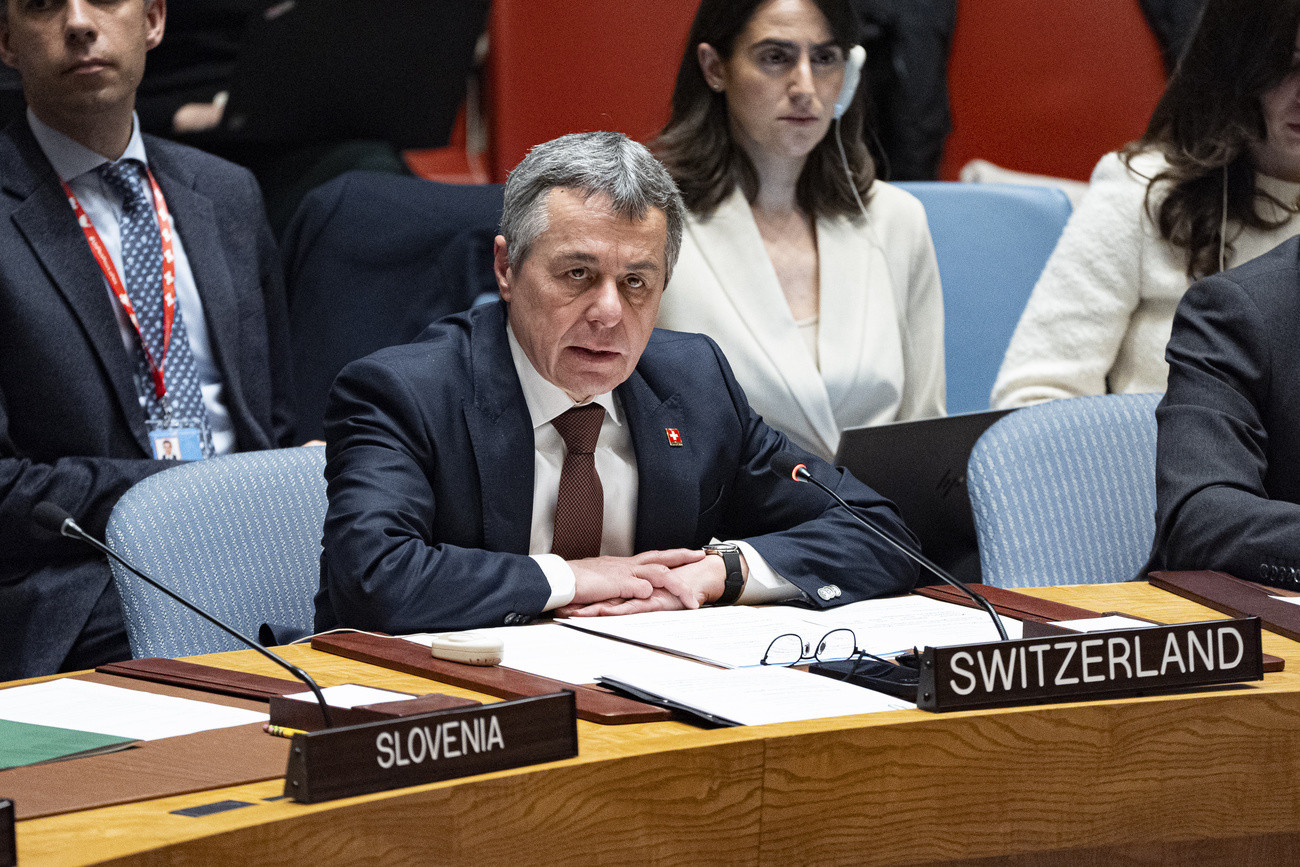
Swiss foreign minister insists on two-state solution for Israel and Palestine

Swiss Foreign Minister Ignazio Cassis on Tuesday urged the United Nations Security Council ‘not to give in to frustrations’ in the Middle East. In New York, the Swiss diplomat reiterated the need for a two-state solution to the Israel-Palestine question.
Addressing the UN Security Council on Tuesday, the Swiss minister called for the “immediate and unconditional” release of the hostages held by Hamas. “The violence seems to know no bounds” in Israel and the Palestinian territories, he added.
“We are not managing to have the impact we would like”, Cassis later told reporters.
Despite two UN Security Council resolutions, not all hostages have been released by Hamas, civilians are being killed every day and international humanitarian law is still being violated, he told the council.
The Swiss minister reiterated Switzerland’s commitment to a two-state solution to the Middle East. No lasting peace could be achieved without a “regional political consensus”, he said, adding that the rapprochement between Israel and certain states indicated possible “common interests”.
+ Timeline: Switzerland and the conflict in the Middle East
Cassis repeated Switzerland’s readiness to bring together the key players in the conflict. Switzerland also supports any effort that could lead to progress, in particular the initiative unveiled on Monday by the European Union.
“We can no longer content ourselves with managing this conflict,” said the Swiss minister. He called for a joint approach between the parties to the conflict, the states in the region and the members of the Security Council. But not with Hamas.
Anticipating a draft Swiss law in February that would ban Hamas, Cassis told reporters in that he considers the Palestinian militant group to be “a terrorist organisation”.
+ Swiss government decides to ban Hamas
“Hamas is not the Palestinians and vice versa,” he said.
UN Secretary-General Antonio Guterres on Tuesday said it was “unacceptable” to reject a two-state solution in the Middle East, without naming the Israeli Prime Minister Benjamin Netanyahu specifically. In his view, this approach facilitates extremism in the region.
Israeli Prime Minister Benjamin Netanyahu said last week that Israel needs security control over all land west of the Jordan River – which covers the Palestinian territories.
+ Poll: Swiss divided over Israeli-Palestinian war
Cassis welcomed Guterres’s “clear” speech. “We should expect to hear more of the same,” he added, without directly “criticising” the Israeli Prime Minister. “The important thing is for the international community to adopt a clear stance,” said the minister. But the resolutions all point in the same direction, that of two states, he added.
Palestinian Foreign Minister Riyad al-Maliki was more direct. Netanyahu “is driven only by his political objective” and his political survival, he said. He called for an international conference to uphold international law.
Israel’s ambassador to the UN in New York, Gilad Erdan, for his part, urged the council to change its approach.
“What will happen if there is a ceasefire? I’ll tell you what will happen. Hamas will remain in power, it will regroup, it will rearm” to target Israel, he said. And he again attacked the attitude of Iran, whose foreign minister, present in the room, he compared to a Nazi.
This news story has been written and carefully fact-checked by an external editorial team. At SWI swissinfo.ch we select the most relevant news for an international audience and use automatic translation tools such as DeepL to translate it into English. Providing you with automatically translated news gives us the time to write more in-depth articles. You can find them here.
If you want to know more about how we work, have a look here, and if you have feedback on this news story please write to english@swissinfo.ch.

In compliance with the JTI standards
More: SWI swissinfo.ch certified by the Journalism Trust Initiative






























You can find an overview of ongoing debates with our journalists here . Please join us!
If you want to start a conversation about a topic raised in this article or want to report factual errors, email us at english@swissinfo.ch.